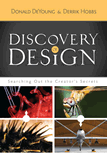Admitting Design
Kenneth Miller, a Brown University cell biologist and professing Catholic who is one of evolution’s most vocal defenders, says it’s time for evolutionists to “reclaim the language of ‘design.’”
It’s a fight evolutionists simply can’t win: “design” exists in nature, even if Darwinists disdain the idea of a designer.
Kenneth Miller, a Brown University cell biologist and professing Catholic who is one of evolution’s most vocal defenders, says it’s time for evolutionists to “reclaim the language of ‘design.’” Miller’s university issued a news release outlining a recent American Association for the Advancement of Science (AAAS) session he led, during which he told his audience:
The idea that there is ‘design’ in nature is very appealing. People want to believe that life isn’t purposeless and random. That’s why the intelligent design movement wins the emotional battle for adherents despite its utter lack of scientific support.1
Miller is coauthor of four biology textbooks, used by millions of students nationwide, and is the author of the forthcoming Only a Theory: Evolution and the Battle for America’s Soul. Miller was also a lead witness in the Dover, Pennsylvania, “Intelligent Design” trial. We’ve had things to say in the past about Miller’s ideas, too—for example, read our full review of a Ken Miller lecture, A Date with Ken Miller.
In his lecture, Miller conceded that Intelligent Design proponents have won the battle of “framing” the debate over evolution, and he added that scientists (presumably excluding those who reject Darwinism) “need to reclaim the language of ‘design’ and the sense of purpose and value inherent in a scientific understanding of nature” in order to “fight back.”
He argues that evolution is based on the idea of design.
And when it comes to pointing out design in nature, Miller does not object. Instead he argues that evolution is based on the idea of design and points to many parts of the human body—including hip and shoulder joints and the curve of the spine—as examples of “design.”
It’s no surprise that Darwinists are finally beginning to recognize that a denial of design rings flat when even ordinary people can plainly see the design around them in nature—not to mention the microscopic design modern scientists, such as well-known Intelligent Design advocate Michael Behe, have revealed.
But Miller’s plea goes beyond biological design; he argues that scientists must also claim “the sense of orderly rationality in nature to which the anti-evolution movement has long appealed.” Yet without a rational Creator God who created an orderly, understandable universe, what reason have we to believe there are natural laws that can be understood? If we are merely blobs of atoms, why should we believe we have the ability to understand other blobs of atoms?
C.S. Lewis, in his book Miracles, explained the difficulty of believing in order without an author of order:
Men became scientific because they expected Law in Nature, and they expected Law in Nature because they believed in a Legislator. In most modern scientists this belief has died: it will be interesting to see how long their confidence in uniformity survives it. Two significant developments have already appeared—the hypothesis of a lawless sub-nature, and the surrender of the claim that science is true. We may be living nearer than we suppose to the end of the Scientific Age.2
Indeed, more and more scientists, such as Ken Miller, are recognizing that science without order doesn’t make any sense. But even if scientists recognize the problem, what can they appeal to for order without appealing to the supernatural? The answer is nothing: without belief in a Creator God who authored order, science becomes a pointless search in the dark—a contradictory search for “truth” when the very Basis of truth is denied.
Footnotes
- Brown University, “There is ‘Design’ in Nature, Biologist Argues” (ScienceDaily, February 18, 2008). AAAS is publisher of the widely regarded journal Science.
- C. S. Lewis, Miracles: A Preliminary Study (London: Collins, 1947), 110.
Recommended Resources

Answers in Genesis is an apologetics ministry, dedicated to helping Christians defend their faith and proclaim the good news of Jesus Christ.
- Customer Service 800.778.3390
- © 2025 Answers in Genesis






